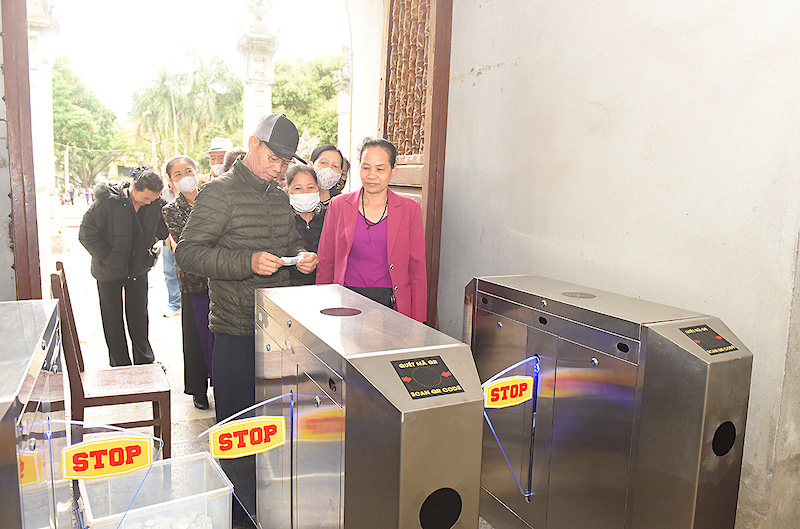Electronic ticketing increases tourist satisfaction in Hanoi
The application of new technologies is essential to move towards smart and friendly tourism and make tourists more satisfied during their travel experience.
Hanoi's tourism industry has been on a quest for technological solutions to serve its development of smart tourism. Integrating QR codes into many of Hanoi's historical sites to enhance the tourist experience is one such solution.
| Local visitors scan QR code through the gate of the Temple of Literature. Photo: Hoai Nam/ The Hanoi Times |
At 8 am, Nguyen Viet Cuong, a tour guide, arrived at the Temple of Literature cultural and historical site with a group of tourists from the northern province of Hai Duong. Instead of buying paper tickets for each person, he only needed to buy one ticket, or an electronic receipt, and scan the QR code for the entire group at the entrance gate.
"I find using electronic tickets more convenient. Previously, 20 people had to stand in line for a long time, but now we only need to scan the QR code at the gate for a few minutes to complete the process," Cuong said.
This is a convenience brought by the electronic ticketing system at the cultural and historical site of the Temple of Literature that has been conducted since June this year.
Khong Minh Huy, a local visitor, told The Hanoi Times that using electronic receipts is not only convenient for groups of travelers but also for individuals, as it eliminates the need to print paper tickets, thus protecting the environment.
Huy, who visited the relic site with his nephew, added that this type of ticket sale is very convenient as tourists only need to scan the QR code on their smartphones to start their exploration of the tourism site.
According to the Center for Scientific and Cultural Activities of the Temple of Literature, the QR code stores enough information about the date and time the ticket was issued and the serial number.
Nguyen Van Tu, deputy director of the Center for Scientific and Cultural Activities of the Temple of Literature, told The Hanoi Times: "Using technology to sell tickets to customers saves printing costs."
He added that integrating QR codes into electronic tickets for customers, especially group tourists, makes it easier for tax authorities to control them.
| Electronic ticketing technology is also being applied at the Thang Long Imperial Citadel. Photo: Nhan Dan newspaper |
Electronic ticketing technology is also used at historical sites such as Thang Long - Hanoi Imperial Citadel, making it easy for tourists to book a visit either through the site's application or the General Department of Tourism's application. A QR code is issued to each successfully booked visitor. When visitors arrive at the relic site, they only need to scan the code to enter.
Nguyen Hong Chi, Director of the Thang Long - Hanoi Heritage Conservation Center, said: "As part of the digital transformation of the culture and tourism industry, we are applying related solutions to promote heritage, using 3D digitization for conservation, applying audio guide software, and introducing QR codes."
Sergiusz Klos, a tourist from the Netherlands, has visited many historical sites in Hanoi and was satisfied with the electronic ticketing system at the Quan Thanh Temple.
He said that this electronic system brings convenience and speed to tourists, from ticket purchases to ticket verification. He said he would prefer to choose destinations and historical sites with electronic ticketing systems because of their advantages.
| Quan Thanh Temple is using the electronic ticket system. Photo: TITC |
Thanh Hung, an international tour guide, highly appreciated the advantages of the electronic ticketing system and enthusiastically shared that he strongly supports the electronic ticketing system at Quan Thanh Temple.
"If Quan Thanh Temple uses online ticket purchases in the future, it will be another step forward in promoting the tourist attraction," he said.
Bui Hong Son, Deputy Director of the Quan Thanh Temple Management Board, said that the Quan Thanh Temple would continue to improve the operation of the electronic ticketing system to make it more convenient for people and tourists to visit the temple.
Statistics from the Hanoi Department of Tourism show that in the first five months of 2023, Hanoi welcomed 10.11 million tourists, an increase of 53.9% year on year, of which more than 1.7 million were international visitors, a nearly tenfold rise interannually.
To promote the development of tourism in Hanoi, the application of new technology is essential to move towards smart, friendly tourism and enhance tourists' experience, according to local experts.













